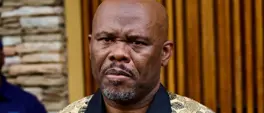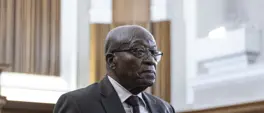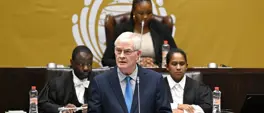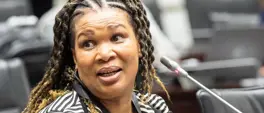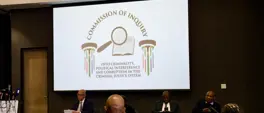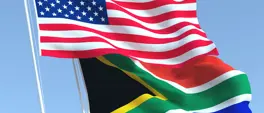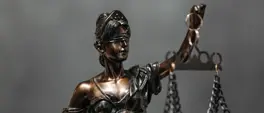Charles Matseke | AfriForum’s memory of Charlie Kirk: 'Unwavering faith' or the persistence of a colonial religion?
Charles Matseke
16 September 2025 | 10:06'As Black people guided by the ethics of Ubuntu, we do not celebrate the fatal shooting of Charlie Kirk. To do so would betray our humanity. What we challenge is not the man’s death, but the white supremacist voice he carried.'
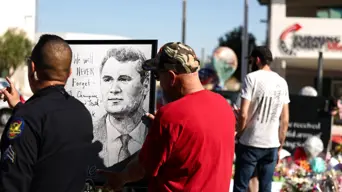
People gather at a makeshift memorial for political activist and Turning Point USA Founder Charlie Kirk outside of the Turning Point USA headquarters in Phoenix, Arizona, on September 14, 2025. Picture: CHARLY TRIBALLEAU / AFP.
When AfriForum released its official statement remembering Charlie Kirk as a man of “unwavering faith and steadfast personality,” I could not help but pause.
What precisely is this “unwavering faith” to which they refer? My mind drifted not to Kirk himself, but to 1492, the year of the Reconquista under Queen Isabella, the forced conversion of Jews and Muslims, and the beginning of European conquest in the Americas.
That year stands as a foundational moment in which Christianity was weaponised as a state ideology: the birth of Christendom as a political project.
From there, a pattern unfolded across centuries with religion enlisted to sanctify conquest, science corrupted to justify racism, and imperialism dressed in the garments of divine duty.
Christianity as a civil religion underpinned colonialism, and later apartheid, embedding in society the belief that whiteness itself was a divinely ordained standard of humanity.
Perhaps this is the “unwavering faith” AfriForum eulogises, a faith that has long provided theological scaffolding for racialdomination.
Charlie Kirk, in his own words, reflected elements of this tradition. His remarks often trafficked in racial suspicion and caricature. One of his most circulated comments revealed his instinctive distrust: “If I see a Black pilot, I’m going to be like, boy, I hope he’s qualified.”
In that statement lay the twin legacies of slavery and segregation: the presumption of Black incompetence and a disdain for diversity policies.
Similarly, Kirk dismissed accomplished Black women leaders, including Joy Reid, Michelle Obama, Sheila Jackson Lee, and Justice Ketanji Brown Jackson, as “affirmative action picks” who, in his words, had “stolen a white person’s slot.”
The rhetoric may sound uniquely American, but its ideological foundations resonate deeply with South Africa’s history.
As T.
Dunbar Moodie notes in The Rise of Afrikanerdom, Afrikaner nationalism was not merely a political project but a quasi-religious“civil religion.”
It sanctified racial separation as divine mandate, cloaked political dominance in moral righteousness, and framed white power as sacred duty. Dan O’Meara’s Forty Lost Years documents how the National Party systematized this worldview between 1948 and 1994, consolidating economic and cultural power while embedding racial hierarchy into every institution.
Though apartheid’s political edifice crumbled in 1994, the ideological residues remain. Narratives of victimhood, particularly the spectre of “white genocide” are deployed as political capital, both within South Africa and in U.S. conservative circles.
The killing of Charlie Kirk casts a dark shadow over political debate
Trump, other officials mourn Charlie Kirk amid 9/11 tributes
The alignment between AfriForum’s worldview and Charlie Kirk’s racial grievance politics is not coincidental; it is a transnational continuation of a strategy that uses fear, identity, and populist fervour to defend minority privilege.
To be fair, Kirk was not without brilliance. He proved adept at mobilising young conservative voters, bridging the gap between Donald Trump and a new generation of Americans. His energy and rigour cannot be denied.
Yet his legacy is inseparable from the populist theatrics, anti-establishment stunts, and racially charged provocations that made him a star.
In remembering him, AfriForum reveals not merely admiration for an individual, but a deeper reflection of whiteness as pathology, the ill-conceived belief that white identity is the universal standard of what it means to be human.
This pathology resonates with South African realities. Orania, a whites-only enclave, stands as a physical embodiment of this faith in white autonomy within a Black-majority democracy.
AfriForum’s eulogy of Kirk is, therefore, less about him than about themselves, their vision for South Africa’ future as one in which racial privilege survives under the guise of cultural preservation.
Here, Steve Biko’s words feel piercingly relevant: “The most potent weapon in the hands of the oppressor is the mind of the oppressed.”
By remembering Kirk as a saint of “unwavering faith,” AfriForum seeks to normalise racial grievance as moral conviction, while simultaneously shaping the imagination of a society still scarred by apartheid’s residues.
Fanon, too, anticipated this cycle of repetition.
In Black Skin, White Masks, he warned: “The colonised is elevated above his jungle status in proportion to his adoption of the mother country’s cultural standards.”
In celebrating Kirk, AfriForum is not only valorising a man, it is reaffirming a worldview in which whiteness remains the metric of civilisation, progress, and legitimacy, even in a democracy ostensibly built on non-racialism.
Meanwhile, movements that once sought to counter this narrative are languishing. The Azanian People’ Organisation (AZAPO) is the sole party still grounded in Black Consciousness but suffers from chronic underfunding, political marginalisation, and organisational neglect. Its silence leaves a vacuum, into which ill-conceived movements mushroom.
Consider the short-lived attempt by the South African Islamic Awakening (SIA) to register a political party aimed at instituting Sharia law. Their emergence reflects not only ideological fragmentation but also the suppression of authentic Black liberation discourses that could have occupied that political space.
As Black peopleguided by the ethics of Ubuntu, we do not celebrate the fatal shooting of Charlie Kirk. To do so would betray our humanity. What we challenge is not the man’s death, but the white supremacist voice he carried. A voice that seeks to dominate without legitimacy in a black majority democracy.
In the end, AfriForum’s remembrance of Kirk forces us to confront an uncomfortable truth: racism is far from over, nor is it an accidental residue of the past. It is continually reconstituted through religion, culture, and politics, surviving in forms both subtle and overt.
What AfriForum sees in Charlie Kirk is not merely a man of faith, but a mirror reflecting their enduring project. The defence of whiteness in a world that increasingly questions its claim to universality.
Get the whole picture 💡
Take a look at the topic timeline for all related articles.




